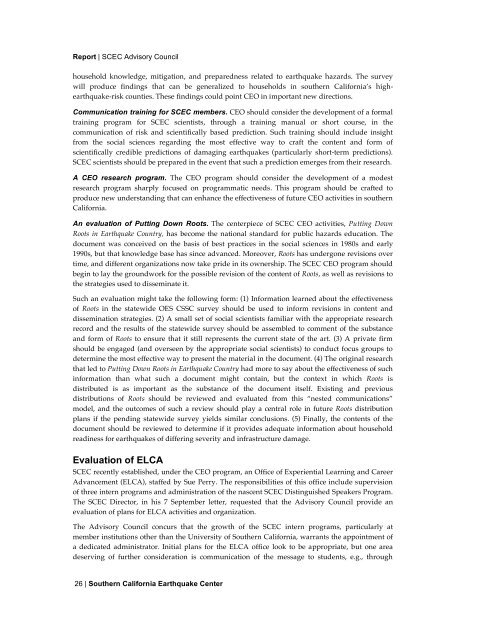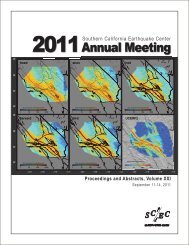Annual Meeting - SCEC.org
Annual Meeting - SCEC.org
Annual Meeting - SCEC.org
- TAGS
- annual
- meeting
- www.scec.org
You also want an ePaper? Increase the reach of your titles
YUMPU automatically turns print PDFs into web optimized ePapers that Google loves.
Report | <strong>SCEC</strong> Advisory Council<br />
household knowledge, mitigation, and preparedness related to earthquake hazards. The survey<br />
will produce findings that can be generalized to households in southern California’s highearthquake-risk<br />
counties. These findings could point CEO in important new directions.<br />
Communication training for <strong>SCEC</strong> members. CEO should consider the development of a formal<br />
training program for <strong>SCEC</strong> scientists, through a training manual or short course, in the<br />
communication of risk and scientifically based prediction. Such training should include insight<br />
from the social sciences regarding the most effective way to craft the content and form of<br />
scientifically credible predictions of damaging earthquakes (particularly short-term predictions).<br />
<strong>SCEC</strong> scientists should be prepared in the event that such a prediction emerges from their research.<br />
A CEO research program. The CEO program should consider the development of a modest<br />
research program sharply focused on programmatic needs. This program should be crafted to<br />
produce new understanding that can enhance the effectiveness of future CEO activities in southern<br />
California.<br />
An evaluation of Putting Down Roots. The centerpiece of <strong>SCEC</strong> CEO activities, Putting Down<br />
Roots in Earthquake Country, has become the national standard for public hazards education. The<br />
document was conceived on the basis of best practices in the social sciences in 1980s and early<br />
1990s, but that knowledge base has since advanced. Moreover, Roots has undergone revisions over<br />
time, and different <strong>org</strong>anizations now take pride in its ownership. The <strong>SCEC</strong> CEO program should<br />
begin to lay the groundwork for the possible revision of the content of Roots, as well as revisions to<br />
the strategies used to disseminate it.<br />
Such an evaluation might take the following form: (1) Information learned about the effectiveness<br />
of Roots in the statewide OES CSSC survey should be used to inform revisions in content and<br />
dissemination strategies. (2) A small set of social scientists familiar with the appropriate research<br />
record and the results of the statewide survey should be assembled to comment of the substance<br />
and form of Roots to ensure that it still represents the current state of the art. (3) A private firm<br />
should be engaged (and overseen by the appropriate social scientists) to conduct focus groups to<br />
determine the most effective way to present the material in the document. (4) The original research<br />
that led to Putting Down Roots in Earthquake Country had more to say about the effectiveness of such<br />
information than what such a document might contain, but the context in which Roots is<br />
distributed is as important as the substance of the document itself. Existing and previous<br />
distributions of Roots should be reviewed and evaluated from this “nested communications”<br />
model, and the outcomes of such a review should play a central role in future Roots distribution<br />
plans if the pending statewide survey yields similar conclusions. (5) Finally, the contents of the<br />
document should be reviewed to determine if it provides adequate information about household<br />
readiness for earthquakes of differing severity and infrastructure damage.<br />
Evaluation of ELCA<br />
<strong>SCEC</strong> recently established, under the CEO program, an Office of Experiential Learning and Career<br />
Advancement (ELCA), staffed by Sue Perry. The responsibilities of this office include supervision<br />
of three intern programs and administration of the nascent <strong>SCEC</strong> Distinguished Speakers Program.<br />
The <strong>SCEC</strong> Director, in his 7 September letter, requested that the Advisory Council provide an<br />
evaluation of plans for ELCA activities and <strong>org</strong>anization.<br />
The Advisory Council concurs that the growth of the <strong>SCEC</strong> intern programs, particularly at<br />
member institutions other than the University of Southern California, warrants the appointment of<br />
a dedicated administrator. Initial plans for the ELCA office look to be appropriate, but one area<br />
deserving of further consideration is communication of the message to students, e.g., through<br />
26 | Southern California Earthquake Center



